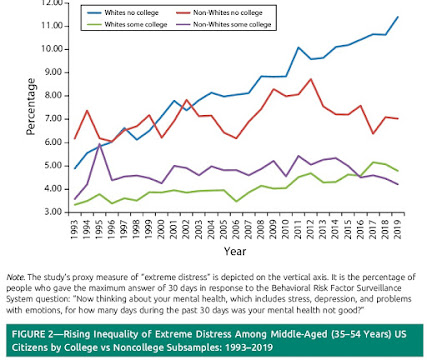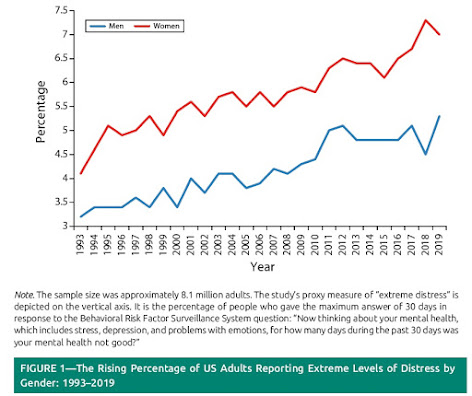The Behavioral Risk Factor Surveillance System (BRFSS) is a standardized phone survey about health-related behaviors, carried out by the Centers for Disease Control and Prevention (CDC).
One question asks: “Now thinking about your mental health, whicjh includes stress, depression, and problems with emotions, for how many days during the past 30 days was your mental health not good?”
David G. Blanchflower and Andrew J. Oswald focus on this question in "Trends in Extreme Distress in the United States, 1993–2019" (American Journal of Public Health, October 2020, pp. 1538-1544). I particular, they focus on the share of people who answer that their mental health was not good for all 30 of the previous 30 days, who they categorize as in a condition of "extreme distress." Here are some patterns:
This graph shows the overall and steady rise for men and women from 1993-2019.
Here's a breakdown for a specific age group of those 35-54 years of age, with a simple breakdown by education and by ethnicity.

This kind of survey evidence doesn't let a researcher test for causality, but it's possible to look at some correlations. The authors write: "Regression analysis revealed that (1) at the personal level, the strongest statistical predictor of extreme distress was `I am unable to work,' and (2) at the state level, a decline in the share of manufacturing jobs was a predictor of greater distress."
Of course, one doesn't want to overinterpret graphs like this. The measures on the left-hand axis are single-digit percentages, after all. But remember, these people are reporting that their mental health hasn't been good for a single day in the last month. The share has been steadily rising over time, through different economic and political conditions. In those pre-COVID days of 2019, 11% of the white, non-college population--call it one out of every nine in this group--reported this form of extreme distress. The implications for both public health and politics seem worth considering.





Leave your comments
Post comment as a guest